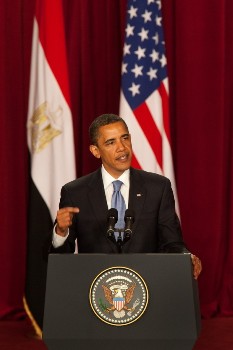Rights groups regret Obama’s speech in Cairo
June 4, 2009 (WASHINGTON) – Several rights groups and activists regretted that US President Barack Obama did not tackle questions of human rights, freedom of the press or the situation for millions of displaced people from Darfur in his speech before an audience at Cairo University.

Obama’s reference to Darfur was included in a part of the speech about global challenges. The particular phrase he used was: “When innocents in Bosnia and Darfur are slaughtered, that is a stain on our collective conscience.”
Nevertheless, Jerry Fowler, President of the Save Darfur Coalition, regretted that the US president had missed an opportunity to reiterate his commitment “to lead for peace in Sudan, where 2.7 million [sic] Muslim civilians have been driven from their homes and hundreds of thousands have perished because of violence orchestrated by the government.”
The US is planning to host soon a delegation in Washington from the Government of Sudan to discuss peace in the Sudan. Three visiting US Senators this year met with senior officials in the Sudanese capital and two were hosted at a dinner by National Security and Intelligence Chief Salah Abdullah Gosh, after which Senator Johnny Isakson reiterated in a published diary his appreciation for Sudan’s cooperation on matters of counterterrorism.
Activists, however, were not satisfied with the president’s silence on the administration’s approach toward Sudan, which it has declined to make public. “The president needs to articulate a clear vision of how a lasting peace is going to be achieved for all of Sudan, and demonstrate through his actions rather than just his words that this is a political priority. The situation in Darfur deserves more than a single sentence of the president’s attention,” said Enough Project Executive Director John Norris.
Norris could not be reached for comment on how many sentences President Obama should have devoted to the matter.
Also regretful of Obama’s speech, Human Rights Watch today noted “On freedom of expression, Obama spoke of the importance of the ‘ability to speak your mind’ but missed the opportunity to criticize the imprisonment of dissidents, journalists, and bloggers in Egypt and elsewhere.”
“Obama failed to address the dire state of human rights in the region,” said a press statement from the rights group.
However, an official of the Government of Sudan welcomed Obama’s speech. “We welcome the new attitude of the Obama administration,” Mustafa Ismail, a senior presidential advisor, told the Los Angeles Times in a telephone interview. “He only mentioned Darfur generally because he wanted to leave a space for the active bilateral dialogue between the U.S. and Sudan.”
The active bilateral dialogue is still in its preliminary stages, according to the head of the America bureau at the Sudanese foreign ministry, Nasr Al-Deen Wali.
President Obama’s counterpart, Sudanese President Omer Hassan Al-Bashir, likewise received a warm welcome when he visited the capital of Egypt in March 2009. Bashir was received at the airport by his Egyptian counterpart Hosni Mubarak and other senior officials in a clear show of support by Cairo.
Field Marshall Al-Bashir once welcomed a speech given by President Obama at Ankara, Turkey, on improving relations with the Muslim world.
(ST)
